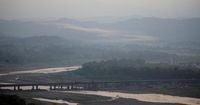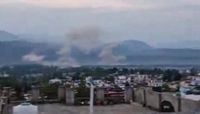Pakistan has officially launched a military operation against India, marking a significant escalation in hostilities between the two nuclear-armed neighbors. This operation, named "Operation Bunyanun Marsoos," targets multiple bases across India, including a missile storage site in the northern region. The announcement follows a series of missile strikes by India that reportedly targeted three air bases, including one near the capital, Islamabad, on May 10, 2025.
The conflict, which has seen a resurgence of violence, began on May 7, 2025, when India conducted strikes against what it termed militant bases inside Pakistan. In response, Pakistan vowed to retaliate, leading to a cycle of escalating military actions. According to Pakistan's military spokesperson, Lieutenant General Ahmed Sharif Chaudhry, the strikes included the destruction of the BrahMos storage site in the Beas area, along with attacks on the Pathankot airfield in Punjab and the Udhampur Air Force Station in Indian-administered Kashmir.
Reports indicate that sounds of explosions were heard in both India's Srinagar and Jammu regions, with sirens sounding in response to the ongoing military actions. The Pakistani military claimed that its air defenses intercepted most of the missiles launched by India, with only a few making it past their defenses. However, the situation remains dire, with at least 48 casualties reported on both sides since the onset of the clashes.
In the wake of the escalating violence, residents in border areas are taking precautions. Amanpreet Dhillon, a 26-year-old Punjabi resident, noted that many families in his village, located just 13 kilometers from the border, have evacuated women and children to safer areas. The fear of further shelling has prompted many to seek refuge wherever possible. In Uri district of Indian-administered Kashmir, residents reported fleeing overnight as houses were struck by shelling, with some hiding behind rocks or in makeshift bunkers.
"We have never seen such intense shelling in our life," stated Bashir Ahmad, a 45-year-old resident of Poonch in Kashmir. The situation in Lahore, a major city in Pakistan, is similarly tense, with residents shaken by drone incursions that Pakistan claims were launched by India. Schools have been closed, and many are stockpiling food and medicine in anticipation of further conflict. Local authorities have issued warnings against price gouging as the demand for supplies surges.
In response to the crisis, the Group of Seven (G7) nations, which includes Canada, France, Germany, Italy, Japan, the United Kingdom, and the United States, have called for immediate dialogue between India and Pakistan. They expressed deep concern for the safety of civilians caught in the crossfire and emphasized the need for de-escalation. A statement from the G7 foreign ministers urged both countries to engage in direct dialogue to find a peaceful resolution to the ongoing conflict.
The current escalation is rooted in a long-standing dispute over Kashmir, a region both nations claim in full but control in parts. The tensions have been exacerbated by a recent attack on Hindu tourists in Kashmir, which India attributed to militants based in Pakistan. Pakistan has denied any involvement in this incident, further complicating the already strained relations.
As the military operations continue, the international community watches closely, with fears that a miscalculation could lead to a broader conflict. The potential for civilian casualties is a pressing concern, as both sides have conducted strikes in populated areas. The situation remains fluid, with military briefings expected from both countries in the coming days.
In summary, the conflict between India and Pakistan has reached a perilous juncture, with both nations engaged in military operations that threaten to escalate further. The humanitarian impact is already being felt, with civilians bearing the brunt of the violence. As calls for restraint grow louder, the hope for a peaceful resolution hangs in the balance.






